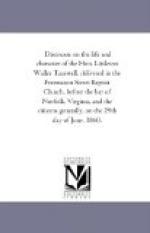“But, besides this temper of superior hardihood and vigor with which he thus endued his mind, there was this further advantage from this process: that his knowledge was much superior both in quantity and accuracy. Sidney’s course of study had resembled a cloudless day in which all was light and every object visible, whether on hill, plain, or in dale; whereas theirs resembled a coruscation by night, in which only the most prominent objects are seen, and that, too, only by sudden and transient glimpses. And hence, I remarked, that very often in the course of their conversation, when they were under the eclipse of one of those Gordian knots, lost in valleys, shade, and darkness, Sidney was in broad and perfect day.
“It was owing, too, as I believe, to the ever-wakeful, intense, and ardent action of the mind, as well as the collateral meditation and study with which he had read, that his memory appeared to have possessed a faculty of discriminating among the subjects offered to its retention, and rejecting the incumbrance of what was worthless, to have seized and holden with indissoluble tenacity everything that was useful, together with all its roots and ramifications. He seems to have examined the historical incidents with which he had met, with all that ’large, sound, round-about sense,’ as Mr. Locke calls it, which was necessary to combine with it all its causes and consequences, and render it practically useful to the purposes of life. I was several times struck with the superior advantages which he derived from these details of relative and antecedent with which he had recorded in his memory historical facts. His fellow-students were acquainted with all the prominent incidents of history; but not having examined them in all their bearings, as they had read, and impressed them, with all their relations of cause and effect, on their minds, it turned out that they frequently attempted to borrow aid from historical incidents, which Sidney, from his more intimate knowledge and mastery of the subjects, was able to seize and drive back upon them like routed elephants upon their own army.
“He surpassed them, too, in those powers which are derived from mathematical study; the power of keeping continually in the mind’s eye, without winking or wavering, the distant proposition which is to be proven; of advancing to it by steady steps on the shortest route; and bearing up, with the strength of Atlas, the most extended and ponderous chain of logical deductions. Such was the habitual steadiness and strength of his mind, that, unlike his fellow-students, I never saw him lose sight, for an instant, of the point in debate, much less shift that point to something else; in advancing to it, I never saw him take one devious step; nor did I ever see him at any moment oppressed or entangled by the concatenation of his argument, or indicate even that he was at all sensible of its weight.




